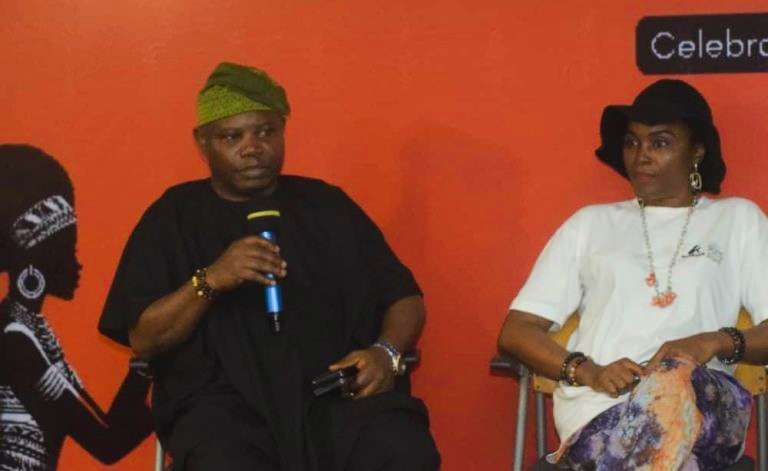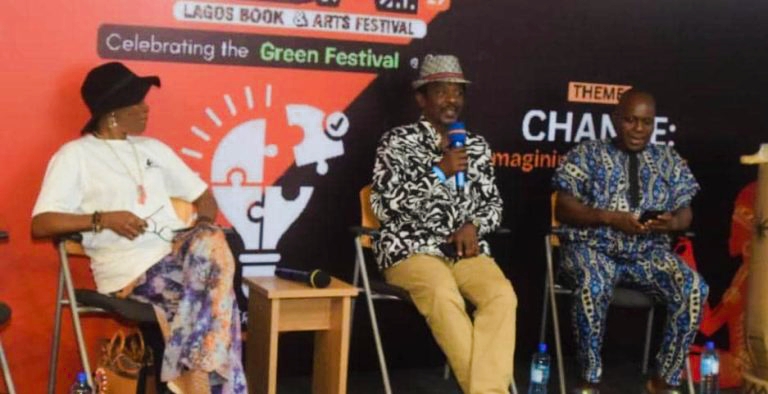CORA Art Stampede 2025: Scrap Culture, Arts, Creative Economy Ministry – Create Endownment Board
CORA 2025 sparks bold debate on empowering Nigerian artists with an endowment board for sustainable cultural growth and true artistic freedom.
By Ejiro Umukoro
Lagos Book and Art Festival (LABAF) closed with the CORA Art Stampede 2025, a high‑energy panel discussion on the state of Nigeria’s creative economy. The central provocative proposition—“scrap the Ministry of Arts, Culture and Creative Economy and replace it with an endowment fund managed by a rotational board—sparked heated debate among stakeholders.
Panelists, including Prof. Segun Ojewuyi (Theatre Studies, University of Illinois), award winning Author and international investigative journalist Lady Ejiro Umukoro, former Federal Director of Culture Mr. Babajide Ajibola, writer Anote Ajeluorou, and moderator Dr. Lukman Sanusi, examined existing government funding mechanisms, their accessibility, and the overall efficacy of state support for artists. The report captures key arguments, recommendations, and insights from the session.
The CORA Art Stampede 2025 highlighted a critical crossroads for Nigeria’s arts sector: reform or dismantle the existing ministry structure. While there are valid concerns about governance and effectiveness, there is also a strong appetite for a more direct, accountable funding model. An independent endowment fund managed by a rotational board could bridge the gap between government resources and the creative community, provided it is backed by transparent systems and strong policy frameworks.
Background
The CORA Art Stampede, held at Freedom Park, Lagos, brought together artists, policymakers, and industry experts to dissect the challenges facing Nigeria’s cultural sector. The event followed a week of panel conversations, exhibitions, and cultural activities. A major point of contention was the effectiveness of current government initiatives like the Investment in Digital and Creative Enterprise Programme (iDICE), Creative Economy Development Fund (CEDC), and a N5 billion Creative Fund Loan managed by Providus Bank, among others. Despite these schemes, many creatives still feel marginalized and underfunded.
Key Discussion Points
Prof. Segun Ojewuyi opened with a radical stance: “Scrap the Ministry of Arts, Culture and Creative Economy. Redirect its budget into an endowment fund.” He argued that ministerial salaries, overheads, and maintenance consume resources that could otherwise fund artists directly. He likened the current structure to a “civil‑service” model that stifles creativity (e.g., the National Troupe of Nigeria becoming stagnant).

Funding Gaps & Misalignment
Existing funds such as iDICE, CEDC, N100bn Creative Fund are underutilized by artists due to complex application processes, high collateral demands (e.g., IP as collateral), and a lack of clarity on whether they are grants, loans, or fellowships.
Lady Ejiro Umukoro shared personal frustrations with inaccessible grant and loan portals and “insane” requirements, calling many schemes exploitative.
Counter‑Arguments: The Case for Retaining the Ministry
Mr. Babajide Ajibola (former Federal Director of Culture) defended the ministry’s role, stating it should set policy but has been hampered by successive ministers. He cited the need for a national culture policy, noting that Nigeria has signed six UNESCO conventions on culture that have not been domesticated.
He also highlighted that artists must become stronger pressure groups to demand accountability.
Proposed Alternative Structure
Endowment Fund & Rotational Board: Ojewuyi suggested creating a fund sourced from current ministry budgets, allocations to NAFEST, ministerial perks, and other cultural events. A rotational board of experts would disburse funds directly to artists.
He referenced examples from the West such as the British Council and National Endowment for the Arts (U.S.)—countries without a culture ministry but with thriving artist support systems.

Challenges Identified
Implementation Risks: Without robust governance, an endowment could also be mismanaged.
Policy Inertia: A stagnant national culture policy and lack of legal frameworks (e.g., UNESCO conventions not domesticated) leave cultural assets vulnerable.
Artists’ Business Acumen: Umukoro urged creatives to adopt corporate governance practices to leverage available funds better.
Stakeholder Perspectives
Anote Ajeluorou (Writer/Culture Journalist): Criticized politicization of culture and empty promises (e.g., President’s endowment fund announcement at the National Theatre). He called for constitutional funding like Brazil’s model.
Dr. Lukman Sanusi who moderated the panel session emphasized the need for data on fund utilization to improve transparency.
Recommendations
Establish an Independent Endowment Fund
- Simplify Access to Funding
- Streamline application forms, eliminate IP collateral, and provide technical support for grant writing.
- Domesticate UNESCO Conventions
- Push the National Assembly to adopt UNESCO cultural conventions to protect Nigeria’s cultural heritage legally.
- Develop a National Culture Policy with Teeth
- Revive and implement a clear policy that outlines funding, roles, and accountability mechanisms.
- Capacity Building for Creatives
- Offer workshops on business planning, financial literacy, and intellectual property rights to help artists navigate funding ecosystems.
- Transparency & Monitoring
- Publish annual reports on fund usage and impact. Use the Nigeria Bureau of Statistics to track cultural sector contributions to GDP.





Comments